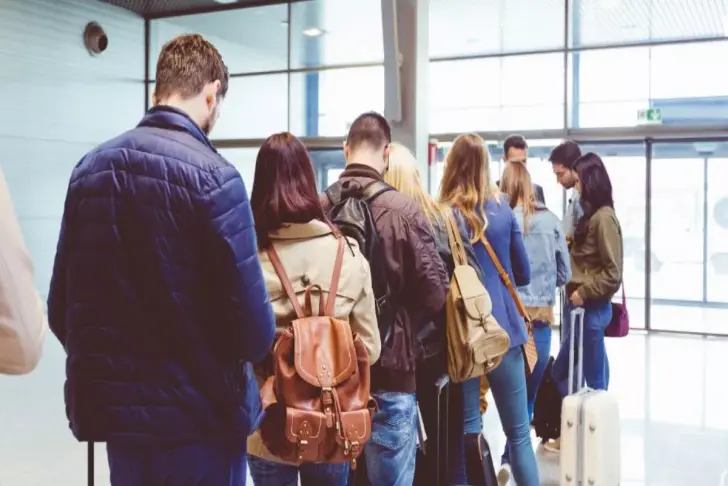Despite Britain's exit from the EU, nationals of the UK are still able to enter the bloc (for a maximum of 90 days in a 180-day period) without a visa. At the moment, border guards manually stamp our passports to enforce this.
It is soon to be automated by a new Entry/Exit System (EES), though, and we will also have to go through a new online verification process called the European Travel Information and Authorization Service (ETIAS) that needs to be finished ahead of time.
Here is everything you need to know about the changes.
When is EES coming into place?
We don’t yet know for sure. It has been delayed several times, but currently the best estimate is November 2024.
What is the new EES?
The new Entry/Exit System comprises the e-gates and the computerised system, which will automatically check UK passports (and many others) at the external borders of countries in the Schengen Area.
It will replace the system of manually stamping passports, which is currently the only way that border officials can monitor whether or not visitors, such as those from the UK, remain within their 90-day limit for visa-free travel.
What is the Schengen Area?
The zone comprises 29 European countries (25 from the EU plus Iceland, Liechtenstein, Norway, and Switzerland), that have abolished internal border controls. Bulgaria and Romania, which joined on March 31 2024, have opened air and maritime borders, but land border controls remain in place for the time being. Cyprus is expected to join Schengen in due course. In the meantime, UK citizens will still need to apply for an ETIAS pass to visit.
British citizens will not need an ETIAS pass to travel to the Republic of Ireland, because it is part of the Common Travel Area with the United Kingdom.
How will it work?
The e-gates will register the person’s name, travel document, biometric data (fingerprints and facial images) and the date and place of entry and exit. You will have to register your photos and fingerprints, which will be stored in the form of biometric data.
Do we anticipate any problems?
Unfortunately, the biggest issues are likely to be for British travellers – especially during the first weeks of operation when virtually all visitors will be using the new gates for the first time and the system will have to log our data from scratch. That is bound to cause hold ups.
Added to that is the additional time needed at particular pinch points. Eurotunnel is on record as estimating that the average time of processing a car at Folkestone will rise from less than a minute to up to seven minutes. This is partly because passports can’t be checked through an open window – passengers will have to get out and use the gates. The scenario for disembarking coach passengers will be even more tedious.
Why is it being brought in?
To improve and automate border security.
What is the ETIAS exactly and when will that come in?
When it is introduced in 2025 – probably about six months after the EES system – the ETIAS will be the EU’s way of automatically checking the credentials of visitors who don’t require a visa and who want to enter the Schengen Area. It will be used for tourism and business travellers and for stays up to the 90-day limit. It is comparable with the Electronic System for Travel Authorization arrangements for tourists entering the US.
How do I apply for an ETIAS pass and how much is it?
When it comes into force in 2025, you will have to make the application online, although the official website and an alternative app are not yet ready.
There is a one-off €7 fee and you will be issued with a pass which lasts for three years, or until the expiry of your passport, whichever comes first. Your ETIAS pass will have to be shown to your airline, train or ferry company before you travel. The EU says that attempting to cross the border without an ETIAS “could have serious consequences, including denial of entry to the Schengen member country.”
What information will you need to provide for an ETIAS pass?
For the online ETIAS application, you will need a valid passport from a qualifying country and an email address. You will also have to complete some personal information including your full name, date of birth and country of residency. And, at the end of the process, there will be some security questions (see below). You will then have to pay the €7 application fee with a debit or credit card. The EU says that most applications “will be processed within minutes”.
What will happen to the information that you give the EU?
All applications are automatically checked against a series of security databases, including Europol, Interpol and a special watchlist which includes certain individuals on the UN list of war criminals, and people who have committed or are likely to commit terrorist or major criminal offences.
What are the ETIAS security questions?
Applicants will be asked to declare if they have a criminal record, which includes criminal damage, terrorism, violence, drug or people trafficking or sexual assault within the past 10 years (20 years for terrorism).
Can you get an ETIAS if you have a criminal record?
The EU says that yes, you will “in most cases, providing information about a criminal record won’t contravene the requirements of an ETIAS visa waiver. However, some serious offences could lead to a refusal.”
If refused, a traveller cannot apply for a visa to travel to Europe for a short stay. They can, however, appeal the decision or apply for a travel authorisation with limited territorial validity.








.svg)
